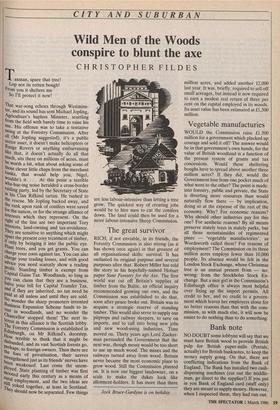CITY AND SUBURBAN
Wild Men of the Woods conspire to blunt the axe
CHRISTOPHER FILDES
Taxman, spare that tree! Lop not its rotten bough! From you it shelters me So I'll protect it now!
That war-song echoes through Westmins- ter, and its sound has sent Michael Jopling, Agriculture's hapless Minister, scuttling from the field with barely time to raise his axe. His offence was to take a tentative swing at the Forestry Commission. After all (Mr Jopling suggested), it's a public sector asset, it doesn't make helicopters or Range Rovers or anything embarrassing like that, it doesn't actually do all that much, sits there on millions of acres, must be worth a bit, what about asking some of those clever little chaps from the merchant banks, that would help you, Nigel, wouldn't it. . . . At this point a terrible wha-hae-ing noise heralded a cross-border raiding party, led by the Secretary of State in his Clan Rifkind tartan. He rushed to the rescue. Mr Jopling backed away, and the rank upon rank of conifers were saved for the nation, or for the strange alliance of interests which they represent. On the right of the line are two important Tory Interests, land-owning and tax-avoidance. They are sensitive to anything which might 11. Pset the present cosy treatment of timber, Plant °illy by bringing it into the public eye. rlant trees, and you get grants. You can Charge your costs against tax. You can also ge your trading losses, and with good advice you need scarcely show a trading Profit. Standing timber is exempt from Capital Gains Tax. Woodlands, so long as You can claim that they are a business, halve your bill for Capital Transfer Tax, and if they are inherited, no tax need be Paid at all unless and until they are sold. 14,0 wonder the sharp promoters invented Business Expansion Scheme funds to in- vest in woodlands, and no wonder the chancellor stopped them! The next in- terest in this alliance is the Scottish lobby. The Forestry Commission is established in t_dinburgh on Mr Rifkind's doorstep. 11.°w terrible to think that it might be disbanded, and its vast Scottish forests go, Perhaps, to foreign owners. Then there are the foes of privatisation, their nerves sbtrengthened just as its friends' nerves have e, en weakened. Last come the unem- P'°Yed. State planting of timber was first mooted early this century as a means of moral employment, and the two ideas are still Yoked together, at least in Scotland. They should now be separated. Few things are less labour-intensive than letting a tree grow. The quickest way of creating jobs would be to hire men to cut the conifers down. The land could then be used for a more labour-intensive Sheep Commission.














































 Previous page
Previous page